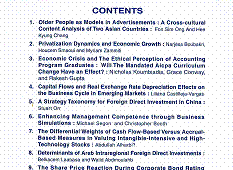Journal of Business and Policy Research
Vol. 12. No. 1., July 2017, Pages: 34 – 53
The Impact of Equity Market Timing on Firm Value: A Behavioral Approach
Frank D’Souza and Ramesh P Rao
Using data on Seasoned Equity Offerings in the U.S. over the period 1980-2000, the effects of equity market timing on the post-issue performance of issuing firms are examined. Most prior research evaluates SEO firms as a single group and find long-run under performance after an SEO. The approach uses the Sentiment Index (Baker & Wurgler, 2006) to extract samples of market timing firms. Then, two distinct subsets are created from this data. The opportunity subset consists of firms that have viable investments opportunities while the temptation subset consists of those that do not. The temptation subset is so called because of the hypothesis that the managers of these firms succumb to the temptation of relatively cheap equity, even though they have no viable use for it. Using a matched sample methodology (Barber and Lyon 1997), the overall sample of market timing SEO firms displaying post-issue under performance is confirmed; however, results show that the negative impact is actually driven by the set of firms without viable investment opportunities (temptation) subset while the opportunity subset does not under perform. On reviewing the use of funds by these firms (Kim & Weisbach, 2008 model), it is confirmed that the opportunity firms invest more heavily in R&D, while the temptation firms seek to invest outside their core business. This research has strong implications for firm financing decisions, especially firms that find themselves in the position to time the market for equity, using a seasoned equity offering.
DOI :
https://doi.org/10.21102/jbpr.2017.07.121.03

